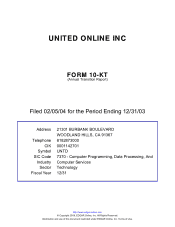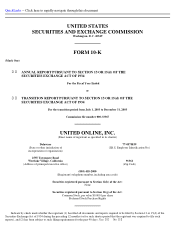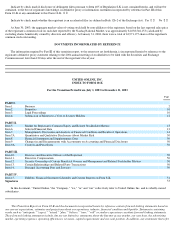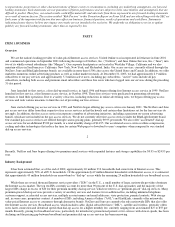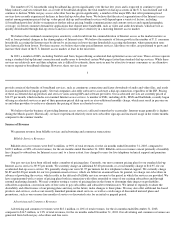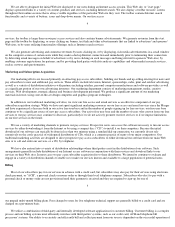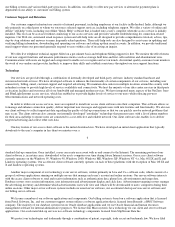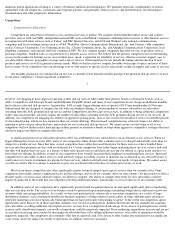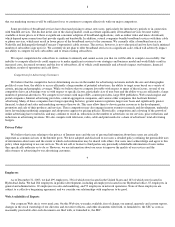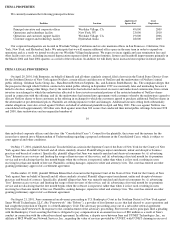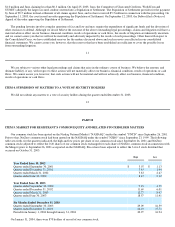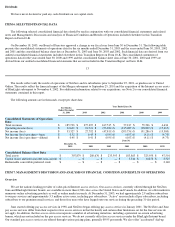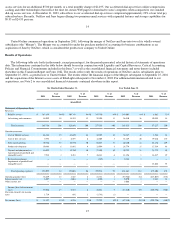Classmates.com 2003 Annual Report Download - page 4
Download and view the complete annual report
Please find page 4 of the 2003 Classmates.com annual report below. You can navigate through the pages in the report by either clicking on the pages listed below, or by using the keyword search tool below to find specific information within the annual report.
to expectations, projections or other characterizations of future events or circumstances, including any underlying assumptions, are forward-
looking statements. Such statements are not guarantees of future performance and are subject to risks, uncertainties and assumptions that are
difficult to predict. Therefore, our actual results could differ materially and adversely from those expressed in any forward-looking statements
as a result of various factors. The section entitled "Risk Factors" in this Transition Report on Form 10-
K and our other filings with the SEC set
forth some of the important risk factors that may affect our business, financial position, results of operations and cash flows. Statements
indicating factors that we believe may impact our results are not intended to be exclusive. We undertake no obligation to revise or update
publicly any forward
-looking statements, other than as required by law.
PART I
ITEM 1. BUSINESS
Overview
We are the nation's leading provider of value-priced Internet access services. United Online was incorporated in Delaware in June 2001
and commenced operations in September 2001 following the merger of NetZero, Inc. ("NetZero") and Juno Online Services, Inc. ("Juno") into
two of its wholly-owned subsidiaries (the "Merger"). Our corporate headquarters are located in Westlake Village, California and we also
maintain offices in San Francisco, California; New York, New York; and Hyderabad, India. Our access services, currently offered through the
NetZero, Juno and BlueLight Internet brands, are available in more than 6,500 cities across the United States and Canada. In addition, we offer
marketers numerous online advertising products as well as online market research. At December 31, 2003, we had approximately 2.9 million
subscribers to our pay services and approximately 5.3 million active users, including pay subscribers. "Active" users include all pay
subscribers, including both access and premium email subscribers and those free users who have logged onto our services during the preceding
31-day period.
Juno launched its first service, a free dial-up email service, in April 1996 and began offering free Internet access service in 1999. NetZero
launched its first service, a free Internet access service, in October 1998. These free services were predicated on generating advertising
revenues to fund their operations. Due to a variety of factors, including reductions in online advertising rates, we began offering pay access
services and took various measures to limit the cost of providing our free services.
Juno started offering pay access services in 1998, and NetZero began offering pay access services in January 2001. The NetZero and Juno
pay access services differ from their respective free access services in that the hourly and certain other limitations set for the free services do
not apply. In addition, the free access services incorporate a number of advertising initiatives, including a persistent on-screen advertising
banner, which are not included on the pay access services. We do not currently offer free access services under the BlueLight Internet brand.
Our standard pay access services are offered through various pricing plans, generally $9.95 per month. We also offer "accelerated" dial-up
access services for an additional $5.00 per month, or a total monthly charge of $14.95. Our accelerated access services utilize compression,
caching and other technologies that reduce the time for certain Web pages to download to users' computers when compared to our standard
dial-up access services.
2
Recently, NetZero and Juno began offering two premium email services with expanded features and storage capabilities for $9.95 or $24.95 per
year.
Industry Background
It has been estimated that, as of the end of 2002, approximately 69 million U.S. households had some form of Internet access. This
represents approximately 70% of all U.S. households. Of the approximately 69 million Internet households with Internet access, it is estimated
that approximately 45 million households use narrowband or "dial-
up" access while the remaining 24 million households use broadband access.
While there are several thousand Internet service providers ("ISPs") in the U.S., a small number of large, nationwide providers dominate
the Internet access market. The top ten ISPs currently account for more than 90 percent of the U.S. dial-up market, and the majority of the
largest ISPs charge in excess of $20 for their premium monthly dial-up service, which we refer to as "premium-priced" dial-up services. Many
premium-priced dial-up services provide a variety of ancillary services and features for no additional fee, including unlimited telephone
customer support, accelerated access services, multiple account names and email addresses, virus protection, parental controls, Web storage
and, in some cases, proprietary content. A number of ISPs, including America Online ("AOL") and EarthLink, currently offer nationwide,
value-priced Internet access to consumers through alternative brands. NetZero and Juno are currently the only nationwide ISPs that also offer
free Internet access services. Broadband access, which includes cable, digital subscriber lines ("DSL"), satellite and wireless, generally offers
users faster connection and download speeds than dial-up access for a higher monthly fee, currently ranging from an estimated $27 to $55 per
month. Recently, pricing for broadband services, particularly for introductory promotional periods or for services with slower speeds, has been
declining and the pricing gap between broadband and premium dial
-
up access services has been narrowing.

